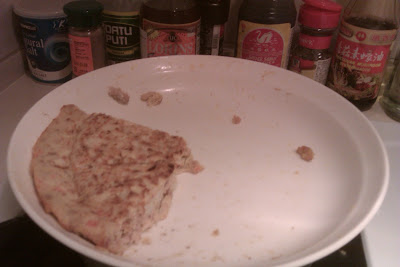Knowledge Management for Development
a global community
On knowledge transfer: Why grandma's kitchen demo trumps any cookbook
My grandmother recently visited our home in Taiwan. On her first day here, my wife and I showed her around our neighborhood. We passed by the local grocery and bought ingredients for "tortang giniling", my favorite dish of hers. For Sunday lunch, she gladly obliged and showed us how to cook the dish. I made a mental note of her process, and it goes like this:
1. Sauté the ground pork (half-kilo) until it's golden brown.
2. Dice one potato and half a carrot, then mix it in the pan.
3. Turn off the heat to cool the pan for a while.
4. Beat two eggs, put a dash of salt, then mix it in the pan.
5. Heat the pan once more and fry each side.

Yummy leftover: Tortang Giniling
Sounds easy, no? While craving for Filipino food a few months back, I called up my grandmother and she told me these same steps. But my effort in the kitchen resulted in a rather unsavory disaster. Some of her reminders just slipped me. Like how the stove should be at the lowest heat level. Or before flipping the patty over, the topside should already be partly cooked from the heat.
It is to say that an actual demo is perhaps the best method of knowledge transfer. Fifteen minutes of watching my grandmother move around the kitchen and listening to her tips (fish sauce is better seasoning than salt) are more than a beginner's cookbook can ever teach me.
Guidance, reinforcement, and correction require a human face to be engaging. Indeed, learning is easier to happen through observing, questioning, and caring for what the mentor is trying to impart. Relying heavily on explicit knowledge – like those contained in phone conversations, email exchanges, or manuals – would inevitably lead to misunderstanding sometimes.
Professional communication, like any other form of mediated communication, is confronted by this very challenge. Try as we might to provide background information, detailed instructions and illustrations, or even how-to videos, nothing comes close to having someone see an end-user through a complex process. Even so, we could try to be more helpful by acknowledging the different levels of information needs and probable scenarios that people may be in.
As for me, I'll stick to washing dishes for the time being.
(First posted at Writer's Cubicle as KM Nexus by Raymond Calbay)
1. Sauté the ground pork (half-kilo) until it's golden brown.
2. Dice one potato and half a carrot, then mix it in the pan.
3. Turn off the heat to cool the pan for a while.
4. Beat two eggs, put a dash of salt, then mix it in the pan.
5. Heat the pan once more and fry each side.

Yummy leftover: Tortang Giniling
Sounds easy, no? While craving for Filipino food a few months back, I called up my grandmother and she told me these same steps. But my effort in the kitchen resulted in a rather unsavory disaster. Some of her reminders just slipped me. Like how the stove should be at the lowest heat level. Or before flipping the patty over, the topside should already be partly cooked from the heat.
It is to say that an actual demo is perhaps the best method of knowledge transfer. Fifteen minutes of watching my grandmother move around the kitchen and listening to her tips (fish sauce is better seasoning than salt) are more than a beginner's cookbook can ever teach me.
Guidance, reinforcement, and correction require a human face to be engaging. Indeed, learning is easier to happen through observing, questioning, and caring for what the mentor is trying to impart. Relying heavily on explicit knowledge – like those contained in phone conversations, email exchanges, or manuals – would inevitably lead to misunderstanding sometimes.
Professional communication, like any other form of mediated communication, is confronted by this very challenge. Try as we might to provide background information, detailed instructions and illustrations, or even how-to videos, nothing comes close to having someone see an end-user through a complex process. Even so, we could try to be more helpful by acknowledging the different levels of information needs and probable scenarios that people may be in.
As for me, I'll stick to washing dishes for the time being.
(First posted at Writer's Cubicle as KM Nexus by Raymond Calbay)
Donate !
***
note if the donate link above does not work for you, click here on donate! and at the bottom of that page click on the donate logo
***
Groups
-
KM4Dev 20 years celebrat…
13 members
-
KM4Dev Core Group
7 members
-
SA-GE - KM4Dev Francopho…
63 members
-
Agenda Knowledge for Dev…
31 members
-
KM4Dev Jobs Centre
345 members
You need to be a member of Knowledge Management for Development to add comments!
Join Knowledge Management for Development